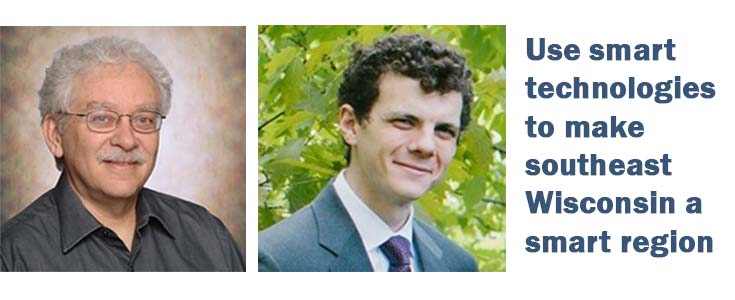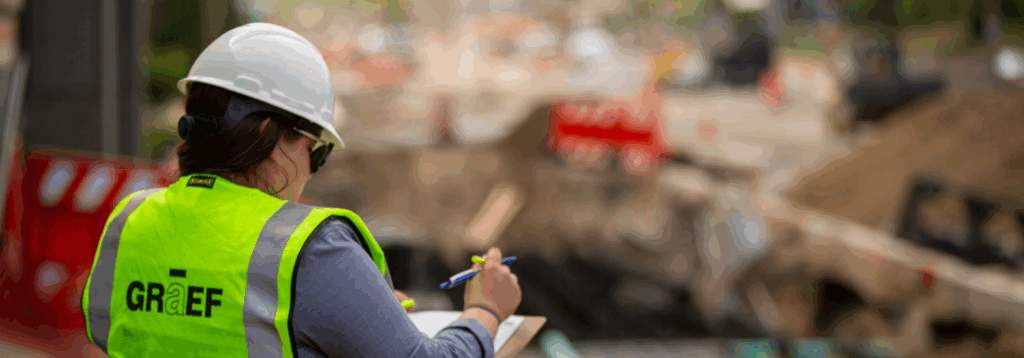Milwaukee Biz Blog features article by Witzling and Block GRAEF Planners Making Wisconsin Smart!

Take a look at the September 12th BizTimes blog written by Larry Witzling and Ben Block from GRAEF's Planning team. They take a look at how SE Wisconsin can be proving grounds for the smart use of technology and smart city leadership...
The promises offered by next-generation technology – to build safer communities, to create efficient networks, to expand opportunities – are not guaranteed. As local developments involve discussion of artificial intelligence and supporting infrastructure like dedicated driverless vehicle lanes, the enormous potential for building smart communities has dominated the minds of planners like us and become a critical issue.
Knowing that southeastern Wisconsin will soon have a new generation of powerful urban management technologies – such as integrated systems of sensors to measure, evaluate, and recommend actions more expansively and quickly than ever before – the question becomes: will we use these new tools wisely and implement them in a planful way?
By our definition, the goal of a smart community is to use technology to accomplish more with less. To build efficiencies in governance that save money; to deliver public services at a higher quality and lower cost; to provide citizens with more knowledge that directly responds to their needs. Globally, many cities are beginning to employ new urban management technologies with the desire to create the exemplar “smart city.” Sidewalk Labs, a subsidiary of Google’s Alphabet, has ambitious plans to transform Toronto into a futuristic neighborhood, full of next-generation technologies promised to alleviate urban problems. At this time, however, these are nothing more than ideas in the clouds – no truly integrated use of such technologies has ever been demonstrated, and the roadmap to creating smart cities remains undefined.
Southeastern Wisconsin has the unique opportunity to be the first to create actual smart cities, but only if we are proactive and deliberate in our implementation of the technologies.
This will mean taking a region-wide approach to adopting the technologies of urban management. No different than issues like job creation, recruitment and retention, transit, or funding cultural amenities, success in building smart cities is dependent on regional coordination.
The advent of next-generation technologies coincides with development opportunities at our doorstep in southeastern Wisconsin, including Foxconn. We have the chance to thoughtfully organize as a region – not just as individual communities. In this phase of preparation, there are a lot of questions: What do we want technology to do for our communities and their residents, workers and visitors? Who pays, who is in charge, and who should be involved? How do we ensure secure networks while fostering grassroots innovation? Determining the answers to these core questions will not be a quick and easy task, and once again points to the need for a regional approach.
Throughout all of this preparation, what matters most is that we ensure that our communities use these technological advances in a positive way. We must apply the new tools in ways that advance our municipal missions and make our communities more robust, more appealing and more resilient.
We must actively undertake pilot projects with new technologies as they become available. Each technology must be adapted to advance the values of each community (rather than changing community values to accommodate technology), and these adapted technologies should fit into a compatible regional framework. If we do this wisely, we can become the exemplar of pragmatic, effective, high-value urban management.
At GRAEF, we design infrastructure every day for municipalities across the state. Because of this work, we know that no two communities are exactly alike, and that’s precisely why customizing smart technology is so necessary. We have compiled a portfolio of emerging technologies that address a broad spectrum of options for designing and managing transportation, water, energy, and public places. Each municipality requires adaptable and unique technological solutions designed to satisfy their specific needs. These technological solutions, while unique, must also be compatible with the tools of neighboring municipalities in order to create an interconnected and robust “smart region.”
When complete, we will have access to data that will help us plan for individual communities, broader counties, and entire regions. This wealth of meaningful, cohesive information will save time and money, ensure integrated infrastructure, improve quality of life, and expand the distribution of opportunity.
In southeastern Wisconsin, we can become thought leaders by building a smart region that becomes the case study and success story for other areas of the nation to look toward. Now, more than ever, we have a big opportunity: the unbridled impact of Foxconn, along with recent announcements from multiple sources stating their desires to build “smart cities,” enables our region to become the proving grounds for the smart use of technology and smart city leadership. We can become the smartest region in the nation – if we plan for it. That’s our vision for southeastern Wisconsin, and we’ll be working with local and state officials and leaders to begin taking the steps forward to make it a reality.
Ben Block is currently a Planner with GRAEF. Ben graduated with departmental honors from the University of Wisconsin Milwaukee with a Master of Urban Planning degree. With a focus on expanding opportunity while protecting the environment, Ben strives to build a career in southeastern Wisconsin planning for equitable and sustainable urban development.
Larry Witzling is a Principal and Planner with GRAEF. He has a Ph.D. in City and Regional Planning from Cornell University and is Professor Emeritus of Architecture at the University of Wisconsin Milwaukee, where he's taught since 1972. Dr. Witzing was named the American Planning Association’s Planning Pioneer of the Year in 2017.
Read the entire blog post here: Milwaukee Biz Blog 9/12/18

